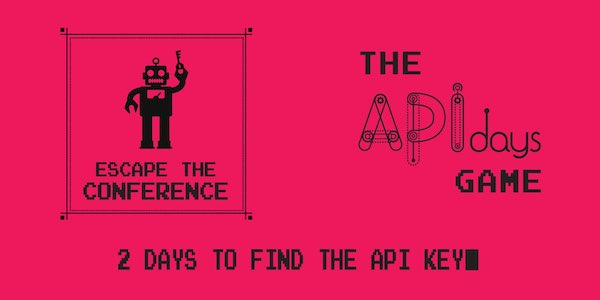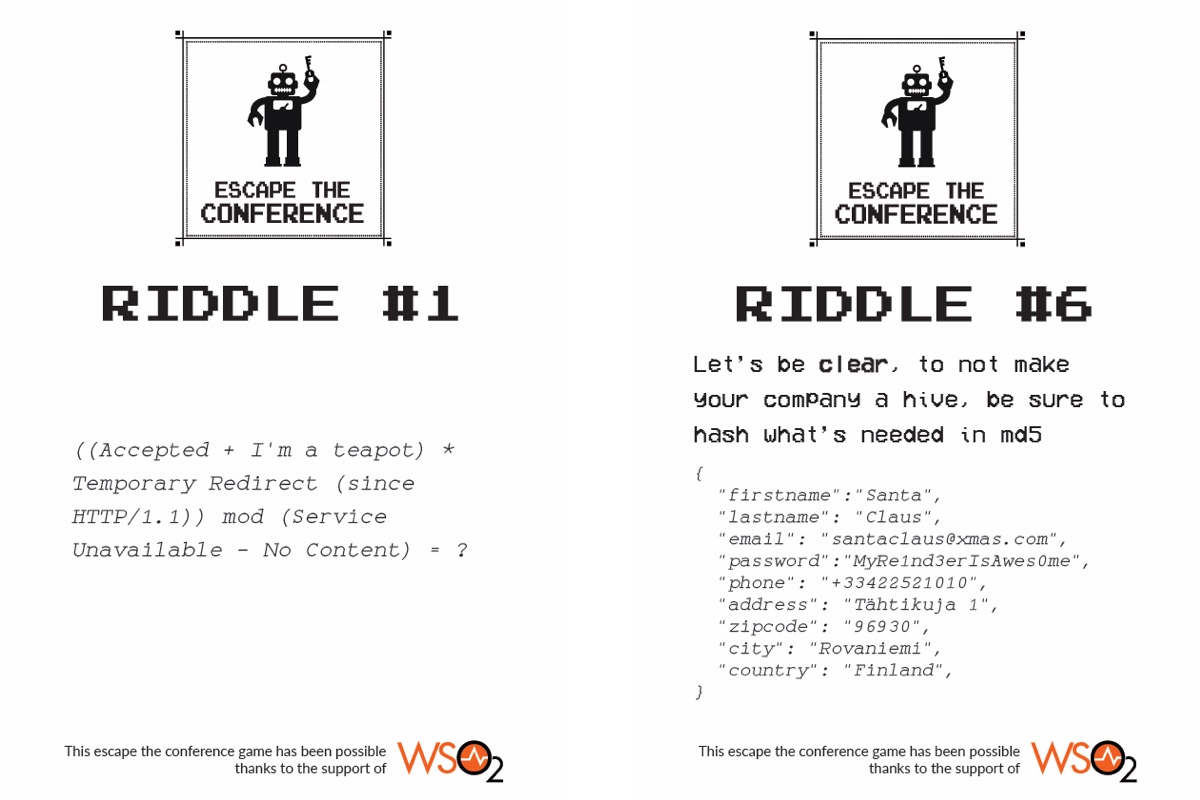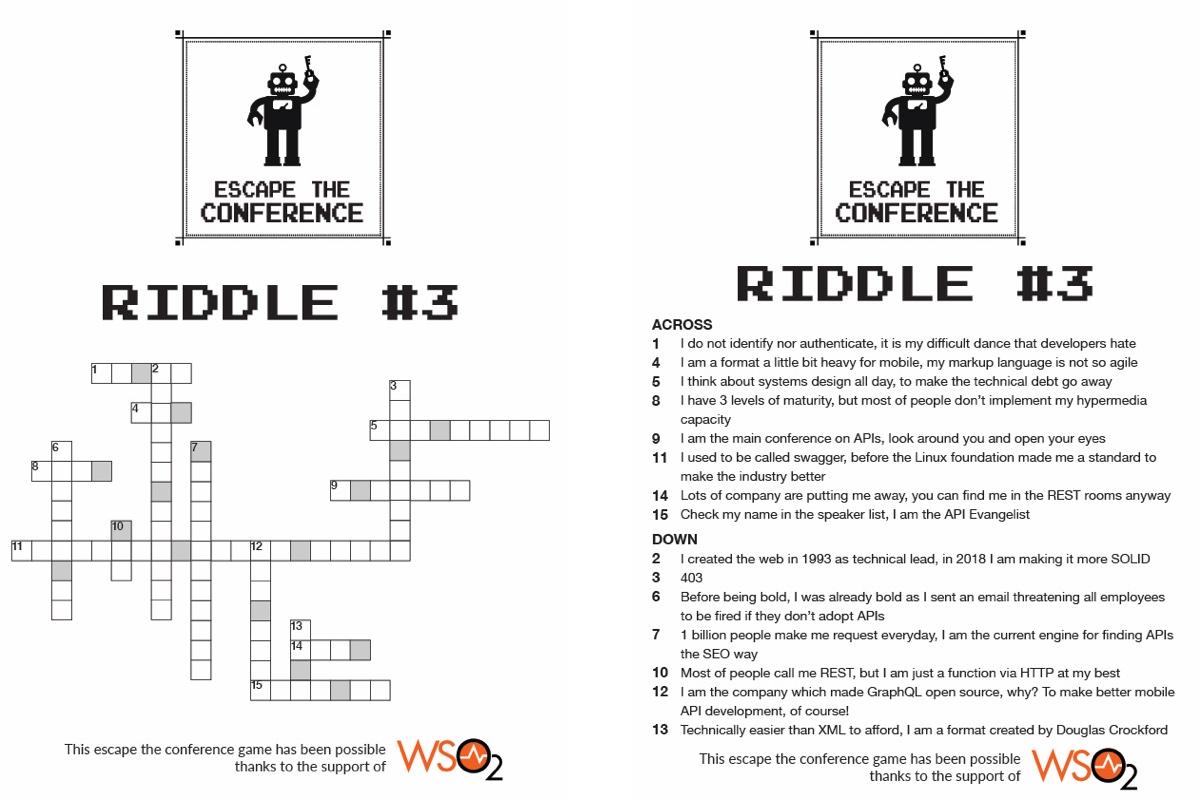Escape the conference: the APIDAYS game
Last December, the biggest edition of APIDAYS was organized in Paris, with more than 2500 attendees. That was a fantastic event, full of energy, amazing speakers and attendees. For this special event, Mehdi Medjaoui wanted to innovate with a game. So we created together “Escape The Conference”.

Will you take the challenge?!
Unlike usual Escape Rooms, no one was locked in a space trying to escape; instead, people had to break in.
“The dark and evil Middleware has stolen all the API knowledge and locked it up in a safe. Find the key to the safe to save us all!”
My booth at the event had 2 things: a locked safe and a giant jar full of keys. The participants had 2 paths to open the safe: Bruteforce it or follow a quest and solve riddles.
Will you be smart or bruteforce to find the api_key to #EscapeTheConference ? #APIdays pic.twitter.com/vT3k75AKGC
— apidays Global (@APIdaysGlobal) December 10, 2018
Most people first started with the Bruteforce method, as you’d expect them to. They searched the jars with their hand, trying to find the only right key among 2500+ others: we’ll cleverly call that key the “api_key”. Hard enough, right. So we added 10 golden keys to reward the lucky finders with an edition of the newly published book “Continuous API Management: Making the Right Decisions in an Evolving Landscape”. In total, more than 750 people searched for the api_key. Multiple times! No one found it, but 8 fortunate ones found golden keys (I guess there was a bit of looking here…)
The second option was to solve riddles that were dissimulated in the venue. To help them find all the riddles, they could navigate a hypermedia maze with only a few rooms giving them clues. Repo here.
The project, built on top of Fortune.js and JSON:API, was largely inspired by Nicolas Grenie who had built APIbunny, a digital egg hunt, for Easter of 2014.
Some people created crawlers, others just randomly sought for information and some drew the maze to find hidden clues. So much commitment!
Once found, people had to solve the riddles. We designed them to be accessible to everyone with a bit of geek culture (the conference is a good mix between developers, business people and everything in the middle). They had to use some logic, mathematics, and knowledge about the API world.

Testing knowledge about status codes and (simple) encryption

The world of APIs in a crossword
All the solutions put together formed a token that could be validated through the API and gave back a password to get to the next step. 15 groups managed to find the token and participated in the last challenge on the 2nd day.
Do you think they are close to it? #apidays #APIdaysParis pic.twitter.com/D1hVXjkwTH
— apidays Global (@APIdaysGlobal) December 12, 2018
Almost there!
The final step was a couple of physical riddles that, in the end, provided a duplicate of the api_key and a UV lamp. Of course, it was easier to open the safe with the duplicate key, but I had been ensuring everyone during 2 days that “indeed, the api_key was in the jar”. So we slowly emptied the jar on the table, looking for the api_key (that was painted with UV paint) with the UV lamp.
Yeah!! We have a winner!!! #escapetheconference #APIdaysParis #apidays pic.twitter.com/jJJMQBXebF
— apidays Global (@APIdaysGlobal) December 12, 2018
Everyone had as much fun solving the riddles as looking for the key. That was awesome to have participants with so much energy and enthusiasm to spare! The lucky winners got a Bose headset and the “Continuous API Management” book; but according to them, the most important was not the prize but the adventure and the thrill to win!
Congrats to Raphael and his friends!! They found the api_key to our #escapetheconference game sponsored by @wso2 !👏👏 #apidays #APIdaysParis pic.twitter.com/Ivgtw0XNfu
— apidays Global (@APIdaysGlobal) December 12, 2018
In the end, feedbacks from participants were great about the story, the riddles, and the concept. They found it brilliant, educative, new, a fun break between talks, and liked the mix of digital and physical. So that was very rewarding for a first edition and raises a lot the expectations for future ones.
I see in this type of game an interesting way to bond and learn together. To make people interact and think, and have more dynamism and movement during tech conferences. I hope to see more gamification like this in future events.
There is also a lot of potential for teaching about technology, products, and tools. This kind of fun and dynamic quests could definitely be used as another way to on-board developers for instance, and thus increase adoption.
What do you think? I’d love to start a conversation on Twitter or IRL.
